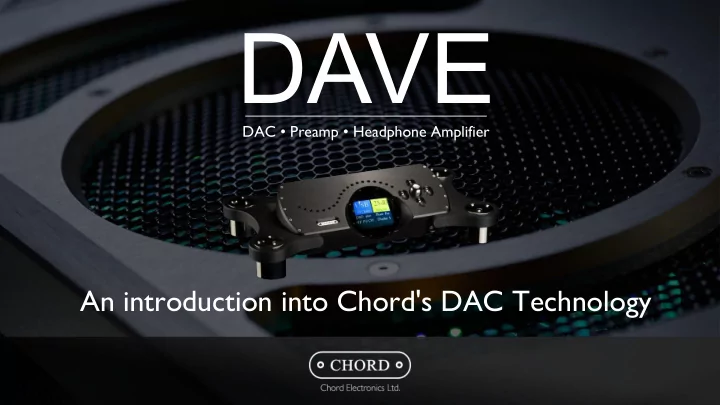

DAVE DAC • Preamp • Headphone Amplifier An introduction into Chord's DAC Technology
WHY DAVE? • DAVE is an acronym of Digital to Analogue Veritas in Extremis • DAVE’s development was centered upon a question: why was Hugo so musical? • Where was Hugo’s sound quality performance coming from in technical terms? • DAVE has an FPGA ten times the capacity of Hugo • This gave opportunities to further improve performance: • Improved time domain (transient timing accuracy) • Improved noise-shaper performance • DAVE has much more advanced analogue electronics
TIME DOMAIN • The primary purpose of a DAC is to reproduce the un-sampled continuous analogue waveform from sampled digital data • Conventional DACs do a poor job of reproducing the original continuous analogue signal, with timing errors on transients • Increasing tap-length of FIR filters gives better time domain accuracy in terms of timing of transients • The ear/brain is extremely sensitive to very small timing errors o Timing accuracy upsets the perception of the start and stopping of notes o It also degrades the ability to perceive instrument timbre and power o It degrades soundstage precision
DAVE WTA FILTERING • DAVE has 164,000-tap WTA filter • The WTA algorithm was subjectively optimised and improved to suit the longer tap lengths • WTA filtering is now up to 256 FS – no other DAC has ever FIR filtered at such a high rate • DAVE has massively parallel processing with 166 DSP cores • Further advanced filtering to 2048 FS • This means DAVE more accurately retrieves the original continuous analogue un-sampled signal
DAVE NOISE-SHAPER • The noise-shaper takes the high-resolution 2048 FS data and converts to 5 bits • It also creates the 20-element Pulse Array outputs, so is the heart of the DAC • Initially, Hugo-standard noise-shapers were employed • But increased FPGA capacity and 20-element operation allows better performance • Over 3 months of continuous listening tests and redesign pushing to improve sound stage depth perception – I (Rob) would not stop until performance would no longer increase • Constantly pushing for better sound stage depth-perception led to world’s most advanced and complex noise-shaper • It employs 17 th order noise-shaping, with a total of 46 integrators; the design of the noise shaper alone would not fit into Hugo’s FPGA.
ANALOGUE • 20-element Pulse Array DAC • Unique 2 nd order analogue noise-shaper for output stage – this gives ultra-high HF linearity and no increase in distortion with difficult loads • Still employs single global feedback path with equivalent of simple 2 resistors and two polypropylene capacitors in direct signal path • Ultra-low-noise sub-milli-ohm power planes for Pulse Array element flip-flops • Digital DC servo • Headphone drive 6V and 0.5A RMS OP capability
MEASURED PERFORMANCE • Maximum output voltage 6V RMS – the reference voltage dBA, measured using APx 555 • THD and noise at 5V RMS 1kHz -124 dBA A wt • THD and noise at 2.5V RMS 1kHz - 127 dBA A wt (-124 dBA into 33 ohms) • THD 1kHz 2.5V RMS 0.000015% • Dynamic Range at -60 dBFS 1kHz -127 dBA A wt • No measurable noise floor modulation, no anharmonic distortion • Analogue distortion characteristic – no distortion for small signals
FFT 2.5v RMS OUTPUT Blue 2.5v RMS, red no signal zero noise floor modulation. Noise floor at -178 dBA, distortion peaks -150 dBA, no anharmonic distortion.
JITTER TEST No measurable jitter artefacts
TWO TONE 19/20kHZ TEST • 1kHz is extraordinarily low at -152 dB • I suspect that the APX555 audio analyzer is adding more distortion than DAVE • Elevated noise floor is the APX555
16bit -90.3dB • 16 bit levels are perfectly reproduced • Note how similar left/right channels are
24bit -90.3dB • No small-signal distortion • Note how similar left/right channels are Extremely low noise
DAVE: CONCLUSION 1. Most advanced DAC technology in the world! 2. Redefines DAC measured performance 3. In my view, it sets new DAC sound quality and musicality performance
Chord Electronics Ltd. /chordelectronic /chordelectronic @chordaudio s s
Recommend
More recommend